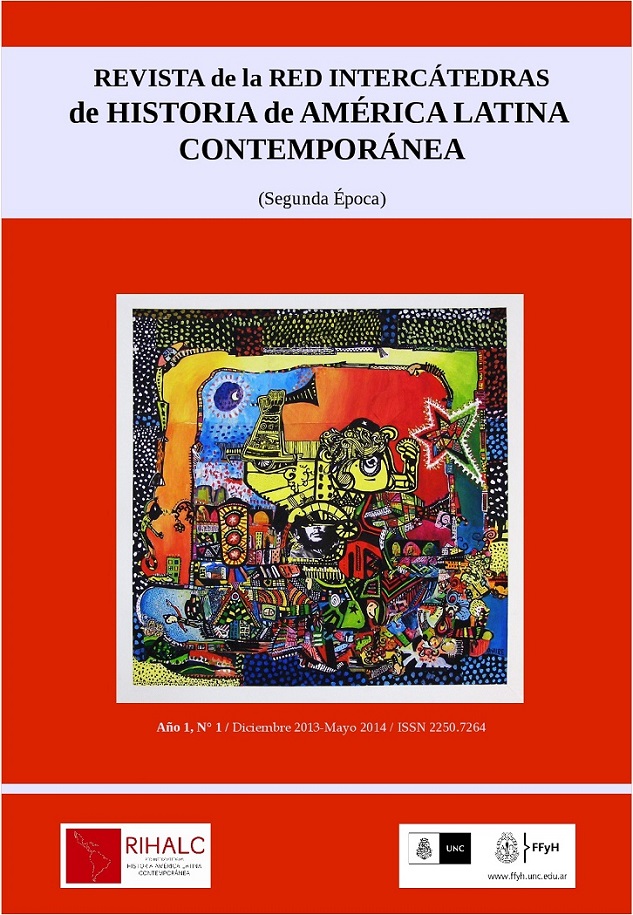ntellectual networks and the Cold War: The Argentine agenda of the Congress for the Freedom of Culture
Keywords:
Historia intelectual, Cultura, Guerra Fría culturalAbstract
The Asociación Argentina por la Libertad de la Cultura (AALC) was created in 1955 as a branch of the Congress for Cultural Freedom (Berlin, 1950), product of the confrontation between East and West in the middle of the Cold War in cultural field. The expansion of this Congress in Argentina is constitutive of a period in which the liberal dominant elites of the fifties began to lose hegemony, and they are being pushed by the new left. In a rupture moment, opposite intellectuals to Peronism, ideologically settled on the basis of cultural liberalism, created the AALC, which it extends over networks of old progressive intelligentsia of groups like Sur, Liberalis and Imago Mundi reviews; organizations like the SADE, the CLES and ASCUA; and the cultural sites of Socialist Party. Between Buenos Aires and Cordoba, the AALC sponsored a complex publishing network, promoted meetings at national universities and took a commitment of solidarity with different international causes, behind the idea of anti-totalitarianism. In a complex scenario that included not only the anti-Peronism/Peronism dichotomy but also the intervention of the Communist world with slogans for peace, democracy (popular) and anti-imperialism, the onset of the association can be read as a moment of rupture in the field of culture that will lead to the decline of the old intelligentsia and the solidification of the new left generation, which will overshadow the political and cultural scene in the following decades.Downloads
References
- ALTAMIRANO, Carlos (2001) Peronismo y cultura de izquierda. Buenos Aires: Tema, 2001.
----------------- (2001b) Bajo el signo de las masas, 1943-1973. Buenos Aires: Emecé.
----------------- (2008, 2010) Historia de los intelectuales en América Latina. Buenos Aires: Katz, 2 vol.
- AGOSTI, Héctor P. (1952) La SADE y la unidad de los escritores. Buenos Aires: ed. del autor.
- ARICÓ, José María (2005) La cola del diablo. Itinerario de Gramsci en América Latina. Buenos Aires: Siglo XXI.
- BISSO, Andrés (2005) Acción Argentina: un antifascismo nacional en tiempos de guerra mundial. Buenos Aires: Prometeo.
- DE DIEGO, José Luis (2003) ¿Quién de nosotros escribirá el Facundo? Intelectuales y escritores en Argentina (1970-1986). Buenos Aires: Al margen.
- ERRO, Carlos A. (1952) Sustancia actual de Echeverría. Buenos Aires: [SADE].
- FIORUCCI, Flavia (2011) Intelectuales y peronismo (1945-1955). Buenos Aires: Biblos.
- GIUSTI, Roberto F. (1953) Conducta de los escritores [Cartas abiertas a Héctor P. Agosti]. Buenos Aires: Ed. del autor.
- GILMAN, Claudia (2003) Entre la pluma y el fusil. Debates y dilemas del escritor revolucionario en América Latina. Buenos Aires: Siglo XXI.
- HALLIDAY, Fred (1993) “Los finales de la Guerra Fría” en Robin Blackburn (ed.), Después de la caída. Barcelona: Crítica.
- JANNELLO, Karina (2012) Intelectuales, revistas, redes editoriales y Guerra Fría. El Congreso por la Libertad de la Cultura en Argentina y América Latina, Buenos Aires, Tesis inédita, IDAES/UNSAM.
----------------------------(2012b) “El Congreso por la Libertad de la Cultura de Europa a Latinoamérica: El caso chileno y la disputa por las “ideas fuerza” de la Guerra Fría” en Izquierdas n° 14, Santiago de Chile, diciembre, pp. 14-52. Disponible en http://www.izquierdas.cl/revista/wp-content/uploads/2012/11/KARINA-JANNELLO.pdf
- JÁUREGUI, Aníbal (2012) “El peronismo en los debates del Partido Comunista Argentino: 1945-1953” en A contracorriente. Una revista de historia social y literatura de América Latina, vol. 9, n° 3, Spring 2012, 22-40.
- KATZ, Friedrich (2004) “La guerra fría en América Latina”, en Daniela Spencer, Espejos de la guerra fría: México, América Central y el Caribe, México, CIESAS, pp. 11-28.
- LOAIZA GIRALDO, Arley (2003) La revue Cuadernos. Un regard des intellectuels anticommunistes sur l’Amerique latine (1953-1966). Mémoire de licence présenté à la Faculté des Lettres de l’Université de Fribourg (Suisse), inédita.
- LUNA, Félix (1976) Conversaciones con José Luis Romero. Sobre una Argentina con historia, política y democracia. Buenos Aires: Timerman.
- MUDROVCIC, María Eugenia (1987) Mundo Nuevo. Cultura y Guerra Fría en la década del 60. Viterbo: Rosario.
- NALLIM, Jorge A. (2014) Transformación y crisis del liberalismo: su desarrollo en la Argentina en el período 1930-1955. Buenos Aires: Gedisa.
- NEIBURG, Federico (1998) La invención del peronismo y la constitución de las ciencias sociales en la Argentina. Buenos Aires: Alianza.
- NOE, Alberto, “Entrevista a Juan Carlos Marín”, [s/f; s/l]. [en línea]. Consultado en octubre 2010. Disp.: www.antroposmoderno.com/word/entrevamarin.doc
- OCAMPO, Victoria; Gabriela Mistral (2007) Esta América nuestra. Correspondencia 1926-1956. Buenos Aires: El cuenco de plata.
- PETRA, Adriana (2013) “Cultura comunista y Guerra Fría: los intelectuales y el Movimiento por la Paz en la Argentina” en Cuadernos de historia, Departamento de Ciencias históricas, USACH, n° 38, junio, pp. 99-130.
- REAL, Juan José (1962) Treinta años de historia argentina. Acción política y experiencia histórica. Buenos Aires/Montevideo: [s.n.].
- REYES, Alfonso; Paz, Octavio (1998) Correspondencia Alfonso Reyes-Octavio Paz (1939-1959). México: Fondo de Cultura Económica.
- ROMERO, Francisco, “Filosofía y libertad” en F. Romero, R. Giusti, J.A. Solari (1958) Filosofía y Libertad. Buenos Aires: Asociación Argentina por la Libertad de la Cultura.
- SARLO, Beatriz (2001) La batalla de las ideas. 1943-1973. Buenos Aires: Emecé.
- SIGAL, Silvia (1991) Intelectuales y poder en Argentina. La década del sesenta. Buenos Aires: Punto Sur.
- SCHLESINGER, Arthur M., Jr. (1988) The vital center. The politics of freedom. New York: A Da Capo.
- SPINELLI, María Estela (2005) Los vencedores vencidos. El antiperonismo y la “revolución libertadora”. Buenos Aires: Biblios.
- TARCUS, Horacio (2007) (dir.). Diccionario biográfico de la Izquierda argentina. De los anarquistas a la “nueva izquierda” (1870-1976). Buenos Aires: Emecé.
- TERÁN, Oscar (1991) nuestros años sesentas. Buenos Aires: Punto Sur.
- TORTTI, María Cristina (2009) El “viejo” Partido Socialista y los orígenes de la “nueva” izquierda. Buenos Aires: Prometeo.
- VIAL, Gonzalo (1996) Historia de Chile, vol IV, La Dictadura de Ibáñez, Santiago: Fundación.
Downloads
Published
How to Cite
Issue
Section
License
Aquellos autores/as que tengan publicaciones con esta revista, aceptan los términos siguientes:
- Los autores/as conservarán sus derechos de autor y garantizarán a la revista el derecho de primera publicación de su obra, el cuál estará simultáneamente sujeto a la Licencia de reconocimiento de Creative Commons que permite la libre distribución con mención de su(s) creadores, no permite el uso comercial ni las obras derivadas. Los autores, al enviar el artículo, acuerdan publicarlo bajo esta licencia..
- Los autores/as podrán adoptar otros acuerdos de licencia no exclusiva de distribución de la versión de la obra publicada (p. ej.: depositarla en un archivo telemático institucional o publicarla en un volumen monográfico) siempre que se indique la publicación inicial en esta revista.
- Se permite y recomienda a los autores/as difundir su obra a través de Internet (p. ej.: en archivos telemáticos institucionales o en su página web) después del proceso de publicación.



